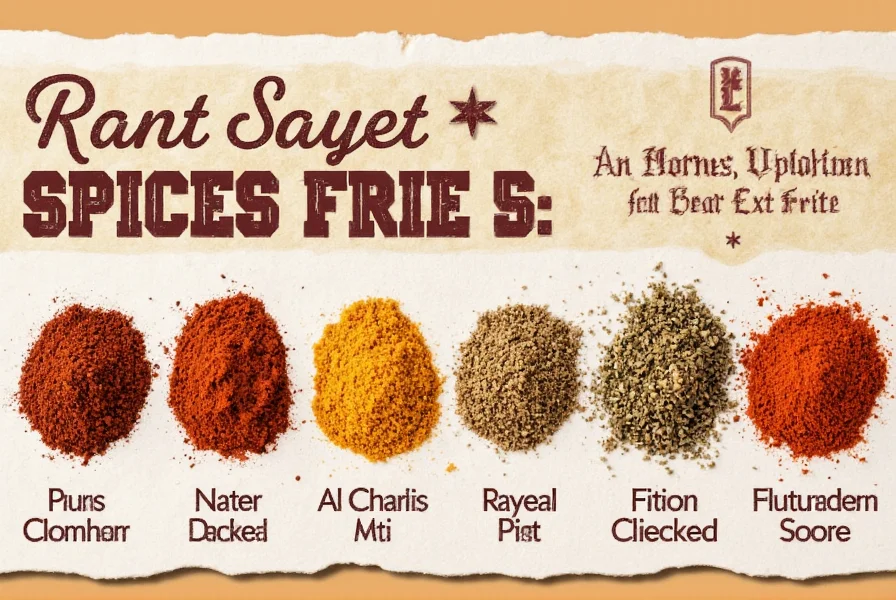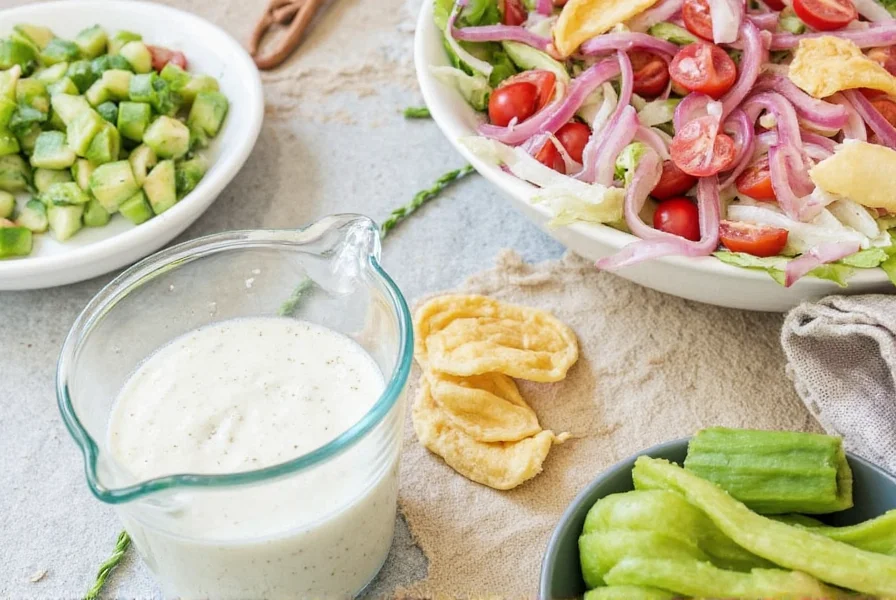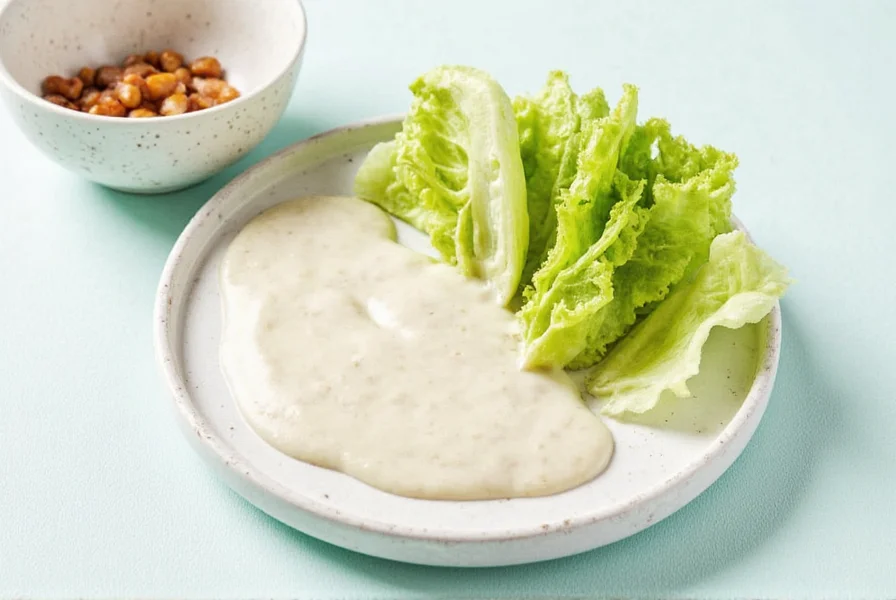Ranch dressing is a beloved American condiment made from a blend of creamy, tangy, and herbaceous ingredients. The key components include:
- Mayonnaise: Provides creaminess and a neutral base.
- Buttermilk: Adds tanginess and balances richness.
- Yogurt (or sour cream): Used for thicker consistency in some recipes.
- Dijon mustard: Adds depth and subtle heat.
- Vinegar: White or apple cider vinegar for acidity and brightness.
- Salt and pepper: Essential for seasoning and enhancing flavors.
- Chives: Offers a fresh, onion-like bite.
- Cilantro: Adds extra freshness in many recipes.
- Garlic powder: Provides a savory note.
- Parsley: Gives the signature green color.
The Basics of Ranch
Ranch dressing originated in the United States, and while its exact origins are debated, most agree that it was created by a man named Steve Henson in the 1950s. He developed the recipe at his restaurant in California, and it quickly became a hit. Today, ranch is one of the most popular dressings worldwide, available in countless variations.
| Feature | Store-Bought | Homemade |
|---|---|---|
| Taste | Consistent, but sometimes overly sweet or bland | Fresher, customizable, and more vibrant |
| Ingredients | Often includes preservatives and artificial additives | Simple, natural, and easy to control |
| Time | Ready to use immediately | Requires a few minutes to mix |
| Cost | More expensive per serving | Less expensive overall |
So, if you want something that tastes better and costs less, making your own ranch is definitely worth the effort.
Tips for Making the Best Ranch
Creating a perfect ranch dressing isn't hard, but it does require attention to detail. Here are some practical tips to help you make the best ranch possible:
- Use fresh herbs: Fresh chives, parsley, and cilantro will give your ranch a brighter, more vibrant flavor.
- Balance the flavors: Taste as you go and adjust the salt, vinegar, and mustard to suit your taste.
- Let it rest: After mixing, let your ranch sit in the fridge for at least 30 minutes to allow the flavors to meld.
- Experiment with variations: Add garlic, hot sauce, or even a splash of lemon juice for a twist.
- Use high-quality mayonnaise: A good brand can make a big difference in the texture and flavor.
With these tips, you'll be well on your way to crafting a ranch dressing that rivals any store-bought version.
Buying Guide: Where to Find the Best Ranch
While homemade ranch is always ideal, there are times when you need a quick option. If you're looking to buy ranch, here are some top picks and what to look for:
Top Ranch Dressing Brands
- Kraft Real Ranch: A classic choice, known for its creamy texture and mild flavor. Great for everyday use.
- Hidden Valley Original Ranch: One of the most popular brands, with a bold, tangy taste that works well on salads and dips.
- Blue Plate Original Ranch: A budget-friendly option with a smooth consistency and strong herb flavor.
- French's Creamy Ranch: Offers a richer, more buttery taste that pairs well with potatoes and sandwiches.
What to Look For When Buying Ranch
- Read the label: Look for minimal additives and real ingredients like buttermilk and fresh herbs.
- Check the fat content: Full-fat ranch is creamier, while low-fat versions may be lighter but less flavorful.
- Consider the occasion: Use a light ranch for salads, and a thicker version for dipping or drizzling over fries.
No matter where you buy it, remember that ranch is a flexible condiment—use it wherever you think it might add a little extra flavor.
Frequently Asked Questions About Ranch Dressing
What are the 5 essential ingredients in ranch dressing?
The 5 essential ingredients in ranch dressing are mayonnaise (for creaminess), buttermilk (for tanginess), garlic powder (for savory depth), onion powder (for aromatic flavor), and fresh herbs like parsley and chives (for freshness and color).
Is buttermilk necessary for ranch dressing?
While buttermilk is traditional and provides the characteristic tangy flavor and thinner consistency of ranch dressing, you can substitute it with plain yogurt or sour cream mixed with a little milk. Some recipes even use Greek yogurt for a thicker, protein-rich alternative.
Why does ranch dressing taste different from brand to brand?
Ranch dressing recipes vary in their herb combinations, seasoning levels, and base ingredients. Some brands use more garlic, others emphasize dill, and the ratio of mayonnaise to buttermilk affects creaminess. Preservatives and stabilizers in commercial brands also impact the final taste and texture.
Can I make ranch dressing without mayo?
Yes, you can make a healthier version of ranch without traditional mayonnaise by using Greek yogurt as the base. This creates a lighter, protein-rich dressing with similar creaminess. Some vegan versions use cashew cream or silken tofu as the base instead.
How long does homemade ranch dressing last in the refrigerator?
Homemade ranch dressing typically lasts 5-7 days in the refrigerator when stored in an airtight container. The shelf life depends on the freshness of your ingredients, particularly the dairy components. Always check for any signs of spoilage like separation, off smells, or mold before using.
Conclusion
Ranch dressing is a delicious combination of mayonnaise, buttermilk, herbs, and a touch of spice that creates a creamy, tangy, and herbaceous sauce. Whether you prefer store-bought or homemade, understanding the ingredients and how they work together can help you make the best version for your taste.
Next time you reach for a bottle of ranch, you'll not only know what's inside but also appreciate the craftsmanship that goes into every drop. And who knows—maybe you'll even feel inspired to make your own!













 浙公网安备
33010002000092号
浙公网安备
33010002000092号 浙B2-20120091-4
浙B2-20120091-4